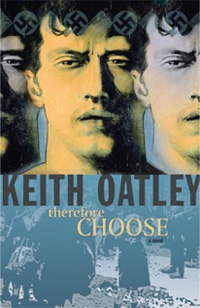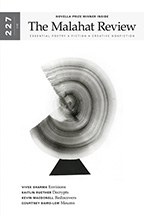Reviews
Fiction Review by Robert G. May
Keith Oatley, Therefore Choose (Fredericton: Goose Lane, 2010). Paperback, 270 pp., $22.95.
Keith Oatley is professor emeritus of cognitive psychology at the University of Toronto. He has written or co-written seven books on the subject of human emotions, including Emotions: A Brief History (2004) and Understanding Emotions (2006), both of which have been translated into several languages. He has also written three novels, The Case of Emily V (1994), which won the Commonwealth Writers’ Prize, A Natural History (1998), and Therefore Choose. Oatley’s latest novel takes place in England and Germany during the Second World War period. It centres on George, a medical student at Cambridge. During a trip to Berlin, George falls in love with a German writer called Anna. When she asks him to live with her in Germany, he must choose between his love for her and the pursuit of his medical vocation. George’s pathological inability to choose makes Hamlet look like a paragon of decisiveness. In an attempt to have it both ways, George first tries to persuade Anna to come and live with him in England. When she refuses, George postpones his decision until political events force his hand. He returns to England not because he thinks his clinical training should take precedence over love, but because he recognizes the impossibility of remaining in a country increasingly hostile towards foreigners. George recognizes the disingenuousness of his choice, and it fills him (and much of the ensuing narrative) with self-recrimination:
Does each life have a centre around which it turns? For George, the centre was…when Anna asked if he would stay in Berlin so that they could spend their lives together. We think the centre will hold. George didn’t understand. He didn’t think of it as a choice he could make. But he did choose. He chose out of anxiety and convention. That was the centre.
Oatley’s training as a cognitive psychologist comes to the fore in his characterization of George, who dwells not in a black-and-white world of right and wrong, but who struggles to the point of mental paralysis with decisions that have unexpectedly far-reaching implications.
The novel is full of vivid descriptions of war and its consequences. In one harrowing passage, Oatley describes what George and his colleague Harold, a medical officer, behold as they enter the Belsen concentration camp. Closer to the end of the novel, Oatley depicts, with brutal directness, Anna’s experience as the Russians invade Germany, reminding the reader that the war had two sides, two sets of victims. Therefore Choose is a well-researched novel, drawing from many published and unpublished sources. When George reads about the German bombardment of Guernica, it is from an actual article from the London Times. In the two-page list of sources Oatley provides at the end of the novel, he points out that his account of the Belsen concentration camp comes directly from the records of his father, a medical officer attached to an artillery regiment, and backed up with further published accounts. When the Allies drop leaflets on Germany declaring its cities to be military targets, the text from the actual leaflets is given, and when George reads an account of the Foreign Office’s advice to British soldiers on how to treat Germans, this material is drawn directly from a field handbook, Instructions for British Servicemen in Germany. Oatley’s inclusion of this documentary material enhances the verisimilitude of the story.
Of the many novels written about the Second World War, Oatley’s stands out for its sensitivity and insight. Students of both history and psychology will find in Therefore Choose a fresh perspective on a welltrod subject.
—Robert G. May









